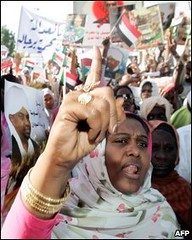
Thousands of Sudanese have demonstrated in support of President Omar Hassan al-Bashir in the aftermath of the warrant issued for his arrest by the ICC.
Originally uploaded by Pan-African News Wire File Photos
AP
DAMASCUS--Arab League countries will not carry out an International Criminal Court request to arrest Sudan’s president on charges of war crimes in Darfur, the group’s leader said.
Arab League chief, Amr Moussa said Qatar — one of the league’s 22 member states — has also rejected a similar request to arrest Sudanese President Omar al-Bashir, who has indicated he will attend an Arab summit in the country later this month.
"The court asked Qatar and the Arab League at the same time, but our legal position on the matter does not allow what the International Criminal Court is requesting," Moussa said on Monday during a visit to Syria.
Only three Arab League states recognise the Netherlands-based court — Jordan, Djibouti and Comoros. It was unclear whether they have endorsed Moussa’s statement.
Moussa did not specify when the court made the requests but said he was concerned about the effect that arresting Sudan’s president would have on the country’s stability.
The court issued its arrest warrant in early March, accusing al-Bashir of orchestrating atrocities against civilians in Darfur, where his government has been battling rebels since 2003. Western-based corporated media sources claim that up to 300 000 people have been killed, and 2,7 million have been driven from their homes.
Al-Bashir has denied the charges and has said he will not co-operate with the court. He has struck a defiant tone, and his trip to Qatar at the end of the month is meant to show he cannot be touched.
He has expelled 13 large foreign aid agencies mainly operating in Darfur, accusing them of spying for the court. The UN has said those expulsions will leave millions at risk of a humanitarian crisis.
On Monday, al-Bashir said he wants all international aid groups out of the country within a year.
Moussa said the Arab League was working with the African Union in trying to halt the court's efforts. Many Arab and African countries have lobbied the UN Security Council to pass a resolution deferring any prosecution of the president for at least a year, hoping to defuse the crisis.
But the US, which has a veto on the council, does not support the move, and there have been some signs of frustration among Arab and African countries with al-Bashir’s tough line.
"Any policy must be based on two things: achieving justice in Darfur and maintaining security and stability in Sudan," said Moussa.
When the court's chief prosecutor first presented his charges against al-Bashir last year, the Arab League said the move undermined Sudan’s sovereignty and only the country's courts should have jurisdiction. — AP.
No comments:
Post a Comment